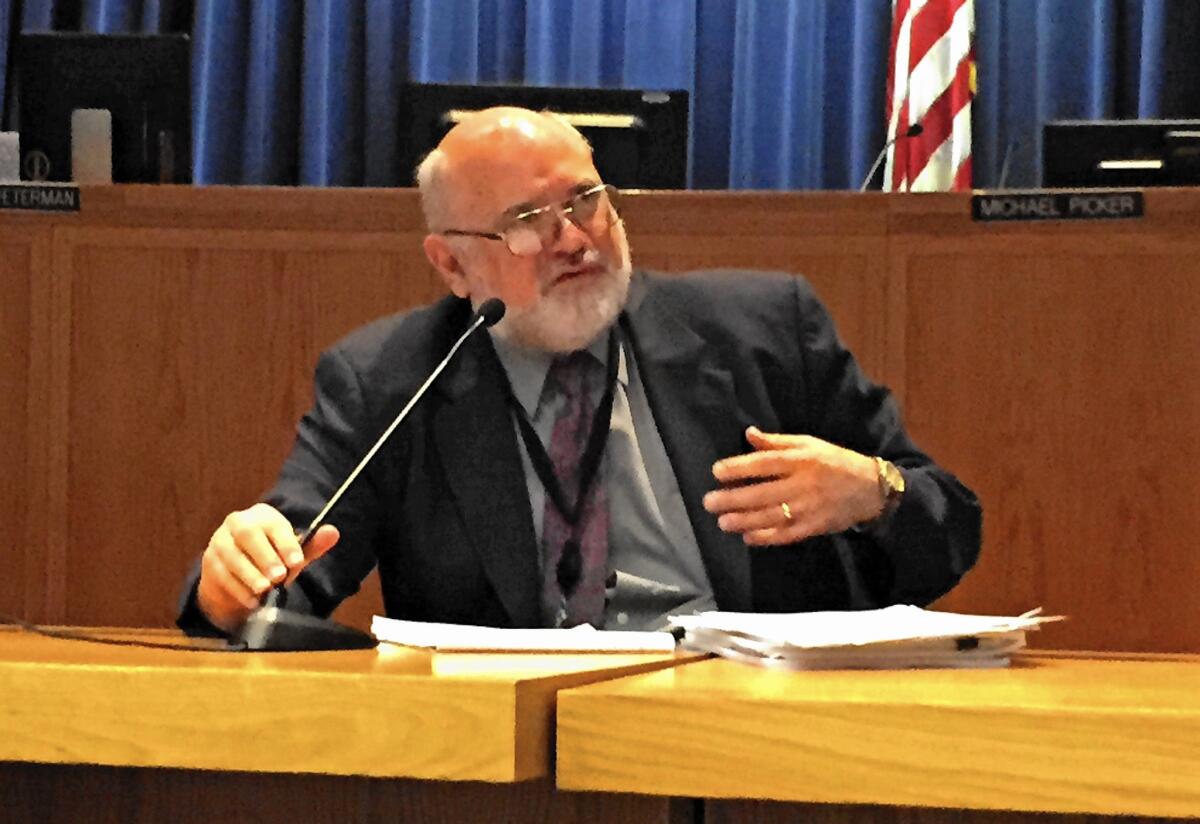PUC gets public input on reform amid outcry over its practices

- Share via
Reporting From San Francisco — California utility regulators, coping with repeated scandals over decisions that are costing utility customers billions of dollars, took the unusual step Wednesday of fielding public comments on how to reform their operations.
The Public Utilities Commission’s two-part hearing opened with reports about how its practices have broken the public’s trust and given unfair advantage to the “wealthy,” in particular the very utilities that the commission regulates.
Michael Strumwasser, author of a report commissioned by the PUC, said regulators’ talks with utility executives and others outside of public view, referred to as ex parte communications, have made the regulatory process unfair.
“Ex parte communications have come to undermine record-based decision making,” Strumwasser said. Such communications give a “huge advantage to well-funded parties.”
Commission President Michael Picker, who took over at year-end, promised reforms after revelations of secret dealings between his predecessor on the commission and the state’s investor-owned utilities.
But Picker’s efforts may be trumped by reform proposals under consideration in the state Legislature.
After the report, the commission then moved on to hear from the public. “The bottom line is the private and secret communications need to stop,” Thomas Long, legal director for the Utility Reform Network, said during the hearing.
Commissioner Mike Florio said it would take time to implement changes, given that there has been a “culture” of how business at the PUC is conducted. But he said things already have been improving.
“The culture has already changed in light of everything that has happened,” Florio said. “It certainly hasn’t been fun to go through.”
The report commissioned by the PUC found that the commission for years has based multibillion-dollar decisions not on public debate or evidentiary records but rather on secret meetings with the companies it regulates.
The report to the commission found that the wholesale lack of compliance with the rules and inclination to favor private corporations over the public good began at the very top of the organization.
“Where were these officials’ ethical compass?” asks the report, which was released late Monday. “What made them think this was appropriate conduct for a CPUC commissioner or a member of a commissioner’s personnel staff?”
The 178-page report includes dozens of recommendations aimed at balancing the scales between utilities and consumer groups and restoring public trust in the commission.
One major recommendation is a prohibition on most ex parte communications.
The trouble with regulators’ secret talks with utilities was highlighted in an Aug. 5 ruling by state Administrative Law Judge Melanie Darling. She ruled that Edison representatives engaged in 10 unreported communications with one or more commissioners or their personal advisors.
The communications, she said, related to the payment of costs related to the January 2012 shutdown of the San Onofre nuclear plant.
Darling’s ruling, which recommends that Edison pay penalties as high as $34 million, sparked new questions about the San Onofre cost settlement as well as the apparently cozy relationship between the commission and the companies it regulates.
Starting last year, PUC commissioners and officials, including former President Michael Peevey, were criticized for improper communications with executives at Pacific Gas & Electric Co. The conversations included how much to fine PG&E for the 2010 explosion of a natural gas transmission line that killed eight people in the Bay Area city of San Bruno.
Thousands of emails also revealed that Peevey, who retired as PUC president at the end of 2014, involved himself personally in internal decision-making at PG&E, extending to matters such as the utility’s corporate leadership, political public relations strategy, safety policies and rate-setting cases affecting billions of customer dollars.
Before his retirement, Peevey denied any wrongdoing and defended his record. He has not been available for comment since then.
Peevey’s involvement with executives of the businesses he regulated has prompted probes by the U.S. attorney’s office in San Francisco and the California attorney general’s office.
In January, state law enforcement authorities searched the La Cañada Flintridge home of Peevey and his wife, Democratic state Sen. Carol Liu. Also searched was the Bay Area residence of former PG&E executive Brian Cherry, who was fired in September along with three other utility executives amid the scandal.
Twitter: @ivanlpenn
More to Read
Inside the business of entertainment
The Wide Shot brings you news, analysis and insights on everything from streaming wars to production — and what it all means for the future.
You may occasionally receive promotional content from the Los Angeles Times.











